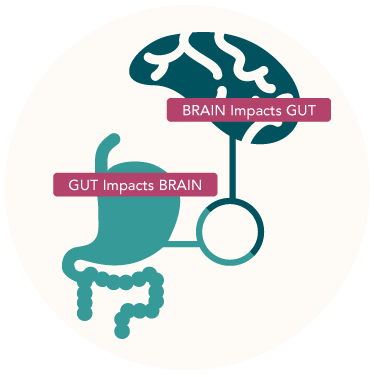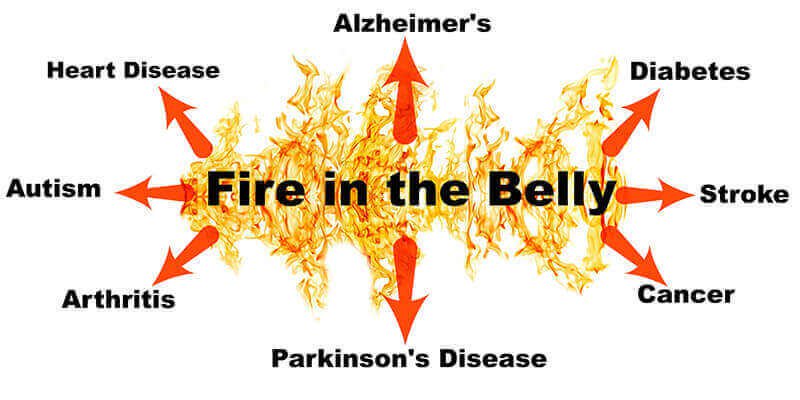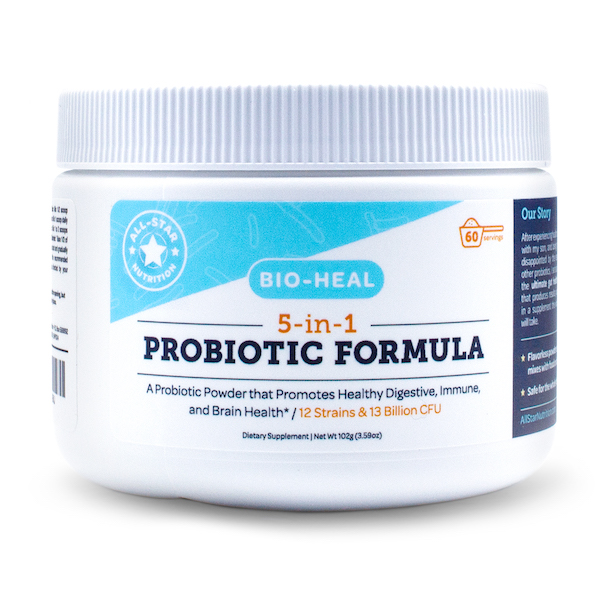
There’s been a tidal wave of research pouring in from the likes of Harvard and Johns Hopkins Medicine revealing the quickest and most effective way to ease the symptoms of Autism may be through, what they’re calling, “the 2nd brain”… aka the “Gut.”
In Fact,
Recently, a review of over 150 papers on ASD and gut bacteria found scientists have been reporting links between bacteria in the gut and autistic behavior since 1960.
The review highlights several studies showing that restoring a healthy balance in gut bacteria can ease the symptoms of ASD.
Here are 3 reasons why…(In easy-to-understand English)
1. The Gut-Brain Axis
To begin to understand the mechanics of the research and why thousands of parents are already implementing strategies based on the studies…and seeing dramatic results…
It’s important to start with the dynamic communication between the gut and the brain.
Let me explain…
Have you ever felt nauseous before giving a speech?
Ever had a “gut feeling” not to do something?
Butterflies in your stomach when you get nervous?
How about experiencing your mood change when you devour the leftover mac n’ cheese?…(There’s a reason they call it “comfort food”).
Well,
That’s because there’s a direct line of communication from your gut to your brain…
Yes…
Your gut speaks to your brain (and vice versa).
The area in your gut responsible for communicating is known as your Enteric Nervous System (EDS).
“The enteric nervous system doesn’t seem capable of thought as we know it, but it communicates back and forth with our big brain—with profound results.”
(Jay Pasricha, M.D., Director of the Johns Hopkins Center for Neurogastroenterology)

In Fact,
The area of your brain that your gut communicates most with is responsible for…
- Mood
- Sociability
- Mental Health
- Human Connection
…and a host of other variables affected by ASD.
Interestingly enough, over 70% of people with Autism also have gastro problems and issues related to their gut.
Additionally,
“…many children with Autism have abnormal communities of digestive bacteria in their intestines. And some of these studies have associated specific types of gut bacteria with more-severe Autism symptoms.”
(Paul Wang, Autism Speaks)
2. Imbalance of Good and Bad Bacteria Causing a “Leaky Gut”
There’s been several studies conducted which have shown the majority of people with ASD have an imbalance of good and bad bacteria.
Specifically, more bad bacteria than good bacteria.
“Our initial work found major differences in the gut bacteria of children with Autism compared to typical children, and our subsequent work has confirmed those findings. Children with Autism seem to be missing hundreds of beneficial gut bacteria.”
(Rosa Krajmalnik Brown – ASU Autism/Aspergers Research Program)
The excess “bad bacteria” inevitably leads to the over-production of toxins which weakens the lining of the intestine, making it permeable…which leads to what’s known as Leaky Gut Syndrome.
Leaky Gut Syndrome is a term used to describe “Hyper-permeable Intestines” which simply means the intestinal lining (your guts’ filter) has holes in it, allowing toxins, yeast, undigested food, and other dangerous pathogens into your bloodstream.
The Effects?
Once the toxins, particles, and pathogens get into your bloodstream, it triggers the immune system to feel stress and danger.
As a response, the body goes into defense mode and becomes inflamed.
Which in turn puts pressure on the brain that intensifies (or creates) behaviors of ASD.
Does that make sense?
If not, read this section one more time…
If there’s nothing else you get from this,
If Autism is a Fire … INFLAMMATION is Gasoline.

Why?…
That question takes us to Reason #3.
3. Chronic Inflammation
One Arizona State University study revealed the results of chronic inflammation (long-term inflammation)… and the parallels to behaviors of ASD is shocking.
Here’s what they found happened with inflammation…
- Cell death in the brain and reduced brain cell formation. In other words, brain cells were dying, and fewer brain cells formed.
- Reducing the response and release of Oxytocin – Oxytocin is the hormone responsible for social interaction, love, human connection, etc.
- Repetitive behavior
- Hypersensitivities
- Movement and coordination issues
Do those results and symptoms sound familiar?
Here the kicker…
In the same study,
When they introduced PROBIOTICS (good healthy bacteria) and a non-inflammatory diet to the test subjects,
The inflammation went down, and virtually all the behaviors and symptoms improved dramatically, and in some cases even went away.
This is why it’s critical to…
- Reduce the inflammation inside of people with Autism.
- Avoid behavior and habits that cause inflammation.
So…
Let’s Recap
1. Your gut directly communicates with your brain – if you have an unhealthy gut, you may also have an unhealthy brain.
2. The studies from Harvard, Johns Hopkins, and more show the majority of people with ASD have a bacteria imbalance in their gut which leads to toxins and pathogens entering their bloodstream. This creates a chronic inflammatory response inside the body.
3. Inflammation puts pressure on the brain and intensifies (or creates) behaviors of ASD.
How do I know if my child has an unhealthy gut? Or is experiencing inflammation?
Unfortunately, these days, with all of the chemicals, toxins, hormones and sugar that gets pumped into the majority of the food and drinks we consume…
The question really isn’t whether it’s happening to them or not – It’s more-so about the severity of the inflammation and unhealthy gut we have to help them manage.
With that said:
If your child has been exposed to or consumed any of the following in the last 12 months…they’re most likely experiencing inflammation.
1- Prescription antibiotics
2- Excessive sugar intake
3- Drinking tap water (chlorine and fluoride)
4- GMO or Processed foods
5- Whole grains & Gluten
6- Emotional stress
7- Exposure to toxins and pesticides (non-organic products)
As you can see, the majority of those come pretty standard with simply being alive today.
Now,
That’s not to say “all is lost” or we’re all doomed.
The good news is, there’s an easy and super-simple solution that only takes 30 seconds a day.
I’ll tell you more about it in just a minute.
But first,
It’s important to understand
The best way to provide the maximum amount of relief from symptoms like mood swings, meltdowns, speech delays, sociability, constipation, bloating, obsessive behavior…
…is by Healing The Gut And Easing Inflammation!
Now,
Just to be clear, I’m not saying it will “make those symptoms disappear” – but it can drastically reduce the intensity and frequency of the symptoms.
“Ok, I get it…so what can I do for my child?”
Well, in addition to the daily 30-second solution I’ll be sharing with you in just a second:
Starting with “diet” is a good place to begin,
There are a handful of key adjustments that can (and should) be made to the daily nutrition of the person with ASD.
Such as, reducing, or even eliminating, wheat, dairy, sugar, and processed foods.
But if you want optimal results?…
…and you want them quickly?
There are two options:
Option #1: You can give your child the following 5 powerful supplements that have been proven to provide substantial relief, fast.
1- PRObiotics
2- PREbiotics
3- Gut Lining Support
4- Digestive Enzymes
5- Neurotransmitter support (AKA “Brain Boosters”)
Sticking with the previous metaphor: If Autism was a fire and Inflammation was gasoline…the combination of those 5 supplements is the fire department ;-).
Now,
With that said…
You can certainly buy all 5 supplements separately.
Personally, I’m a big fan of TriEnza Enzymes as an option for a digestive enzyme.
But it can be both expensive and difficult to get your child to swallow 5 different supplements every morning.
That’s why it might make sense for you to try Option #2:
Simply give your child one scoop of Bio-Heal every morning with their breakfast.
(it only takes 30 seconds)
What Is Bio-Heal?
Thanks to Marty Orefice (A Parent of a child with Autism and founder of All-Star Nutrition) and some of the world’s leading chemists and nutrition experts…
Bio-Heal was created as the first and only supplement that is carefully crafted and specifically engineered to support children with Autism.
It contains high-quality versions of all 5 “fire-department” supplements in one scoop – so there’s no need to spend money on 5 different supplements.
“But will my kid even take it?”
One of the major benefits of having a REAL parent of a child with autism behind the making of Bio-Heal; is the fact he understands the hypersensitivities children with autism have…
…and how difficult it can be to sneak anything past their picky palates 😉
Which is why Bio-Heal comes in a flavorless powder that goes undetected and is easy to mix into a favorite food or beverage.
The kids never even know they’re taking it.
Is it safe?
Short answer? YES!
It’s all-natural and free of nuts, tree-nuts, dairy, gluten, wheat, and eggs.
As a supplement made FOR children with autism – by parents WITH children with autism – they go the extra mile to make sure ONLY the safest, purest, and highest-quality ingredients make it inside of our bottles.
Each of the ingredients in Bio-Heal is tested by an FDA cGMP certified facility in the U.S. for quality, safety, and strength.
Then a sample batch of Bio-Heal is processed and tested again.
After both tests are passed, a random set of bottles from that batch are sent to a 3rd party lab and tested for
- Safety
- Strength
- Composition
- And Purity
Then and only then do they have the bottles shipped to the warehouse for distribution.
So, to reiterate, Bio-Heal is safe for your child to take.
“What are other parents saying about it?”
With over 1000+ 5-star reviews…
And success stories like these…
Jenny Fallet says… “Life changing for this mom of 3!”
“Within 2 weeks of using Bio-Heal, I saw HUGE positive differences in my 3 kids. My oldest son Jack (7), is so much calmer and has been listening to a lot more when asked to do his chores. Less fighting with him. My middle child, Hunter (5), was diagnosed with nonverbal Autism and SPD when he was 2 but as the years went on, he was saying about 10-15 words. Since using this supplement, his speech has changed phenomenally, and has even been using the potty without being timed! He just knows when he needs to go! Last but not least, my youngest daughter, Raegan (4), has also been improving in her speech and way fewer meltdowns! I will be continuing with this product forever!! The changes in my children within weeks have been such a beautiful thing and I couldn’t be happier to see them all succeed! Thank you!”
And Eshraga Taha says… “Unexpected results.”
“I bought this product for my daughter with Autism and long-standing GI issues. I was desperate and didn’t know what else to do, started using it and within 1 week, yes only 1 week my girl started to talk in clear words, longer sentences, and became more confident. Her sensory issues are much less now, no tantrums at all, not to mention the resolution of her GI issues completely. I can’t thank you enough or find the right words to express my feelings, I am amazed by this product.
You won a lifetime customer!“
It’s easy to see why Bio-Heal has quickly become the favorite go-to-supplement parents are choosing to give their kids.
Feel free to try a Bottle HERE
Who knows? You and your child might experience the same results as the parents above and thousands of others.
With Bio-Heal’s Guarantee, You Have Nothing To Lose:
The makers of Bio-Heal didn’t want to simply “say” we’re confident in the results Bio-Heal can provide.
They wanted to show it by extending an unheard of guarantee that puts the pressure on them to make sure you’re satisfied with Bio-Heal.
With that said:
If you are not satisfied with Bio-Heal in the first 90-days,
All you have to do is send the bottle back (even if it’s empty) and we will refund you 100% of your money (minus the shipping).
I suppose you could think of it as a 90-day trial?
Some might even call it a “no-brainer”? 😉
If you want to put the invisible-fire out inside your child’s gut – and reduce the intensity and frequency of their symptoms of autism…
If anyone deserves a shot at reaching their full potential, it’s kids with autism.
Giving Them Bio-Heal is one way to help them reach it.
All the best,
The Loving Autism Team


About Author: Loving Autism
Loving Autism is an organization committed to supporting the health and development of children with autism; by bringing awareness to research-backed solutions based on nutrition, supplements, and lifestyle adaptations.
Resources Used in Creating this Article:
General Gut-Brain Connection: http://www.johnshopkinshealthreview.com/issues/fall-winter-2015/articles/the-garden-in-your-guthttps://www.health.harvard.edu/diseases-and-conditions/the-gut-brain-connection
Gut microbe study shows promise as a potential treatment for autism https://asunow.asu.edu/20170123-discoveries-asu-gut-microbe-study-shows-promise-potential-treatment-autism
The Gut Microbiota and Autism Spectrum Disorders https://www.ncbi.nlm.nih.gov/pmc/articles/PMC5408485/
Can probiotics benefit children with autism spectrum disorders?https://www.ncbi.nlm.nih.gov/pmc/articles/PMC5155168/
Comprehensive Nutritional and Dietary Intervention for Autism Spectrum Disorder-A Randomized, Controlled 12-Month Trial https://www.ncbi.nlm.nih.gov/pubmed/29562612 (Full Text – http://www.mdpi.com/2072-6643/10/3/369)
Ketogenic diet versus gluten free casein free diet in autistic children: a case-control study. https://www.ncbi.nlm.nih.gov/pubmed/28808808
Gut microbiota’s effect on mental health: The gut-brain axis https://www.ncbi.nlm.nih.gov/pmc/articles/PMC5641835/
Autism and nutrition: the role of the gut-brain axis https://www.cambridge.org/core/journals/nutrition-research-reviews/article/autism-and-nutrition-the-role-of-the-gutbrain-axis/76735D9541EB3D2A86099583F42B39CF
Microbiota Transfer Therapy alters the gut ecosystem and improves gastrointestinal and autism symptoms: an open-label study https://www.ncbi.nlm.nih.gov/pmc/articles/PMC5264285/
Gut microbe study shows promise as a potential treatment for autism https://asunow.asu.edu/20170123-discoveries-asu-gut-microbe-study-shows-promise-potential-treatment-autism
The strong correlation of gastrointestinal symptoms with autism severity indicates that children with more severe autism are likely to have more severe gastrointestinal symptoms and vice versa.https://www.ncbi.nlm.nih.gov/pubmed/21410934
Microbial Reconstitution Reverses Maternal Diet-Induced Social and Synaptic Deficits in Offspring (L. reuteri treatment restores oxytocin levels, VTA plasticity, and social behaviors) https://www.cell.com/cell/fulltext/S0092-8674(16)30730-9
Autism Speaks – Spotlight on the Gut Bacteria-Brain Connection in Autism https://www.autismspeaks.org/science/science-news/spotlight-gut-bacteria-brain-connection-autism
The Gut Microbiome: A New Frontier in Autism Research https://www.ncbi.nlm.nih.gov/pmc/articles/PMC3564498/
Relationships between diet-related changes in the gut microbiome and cognitive flexibility https://www.ncbi.nlm.nih.gov/pubmed/25982560
Probiotics & Autism: https://www.ncbi.nlm.nih.gov/pubmed/28686541
The Perturbance of Microbiome and Gut-Brain Axis in Autism Spectrum Disorders http://www.mdpi.com/1422-0067/19/8/2251/htm
A prebiotic intervention study in children with autism spectrum disorders (ASDs). https://www.ncbi.nlm.nih.gov/pubmed/30071894
Dietary interventions for autism spectrum disorder: New perspectives from the gut-brain axis https://www.sciencedirect.com/science/article/abs/pii/S0031938418305080
Dysbiosis of the microbiome and probiotic treatment in a genetic model of autism spectrum disorders https://www.sciencedirect.com/science/article/pii/S0889159118301880?via%3Dihub
Gut microbiota in autism and mood disorders https://www.ncbi.nlm.nih.gov/pubmed/26755882
Gastrointestinal microbiota in children with autism in Slovakia https://www.ncbi.nlm.nih.gov/pubmed/25446201



